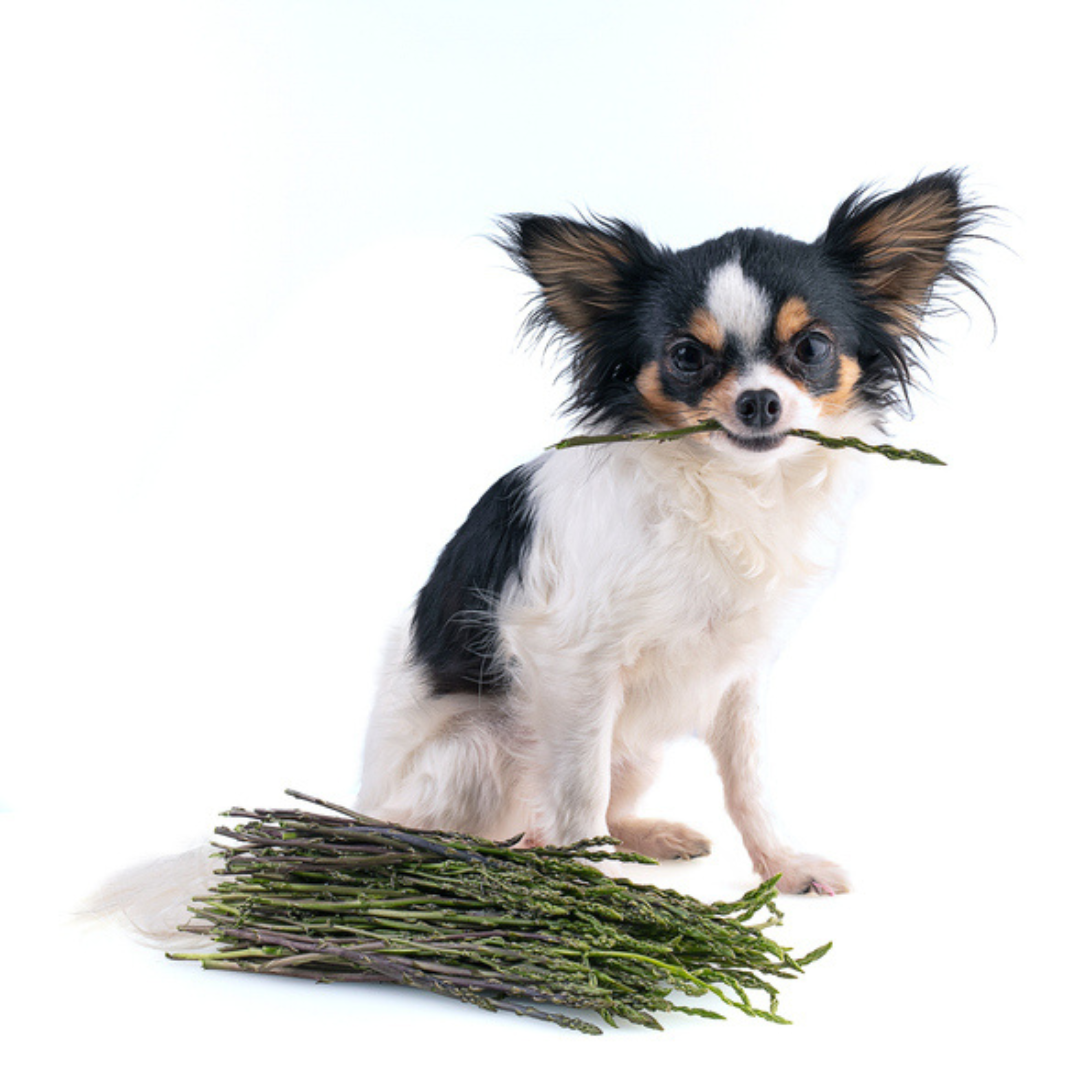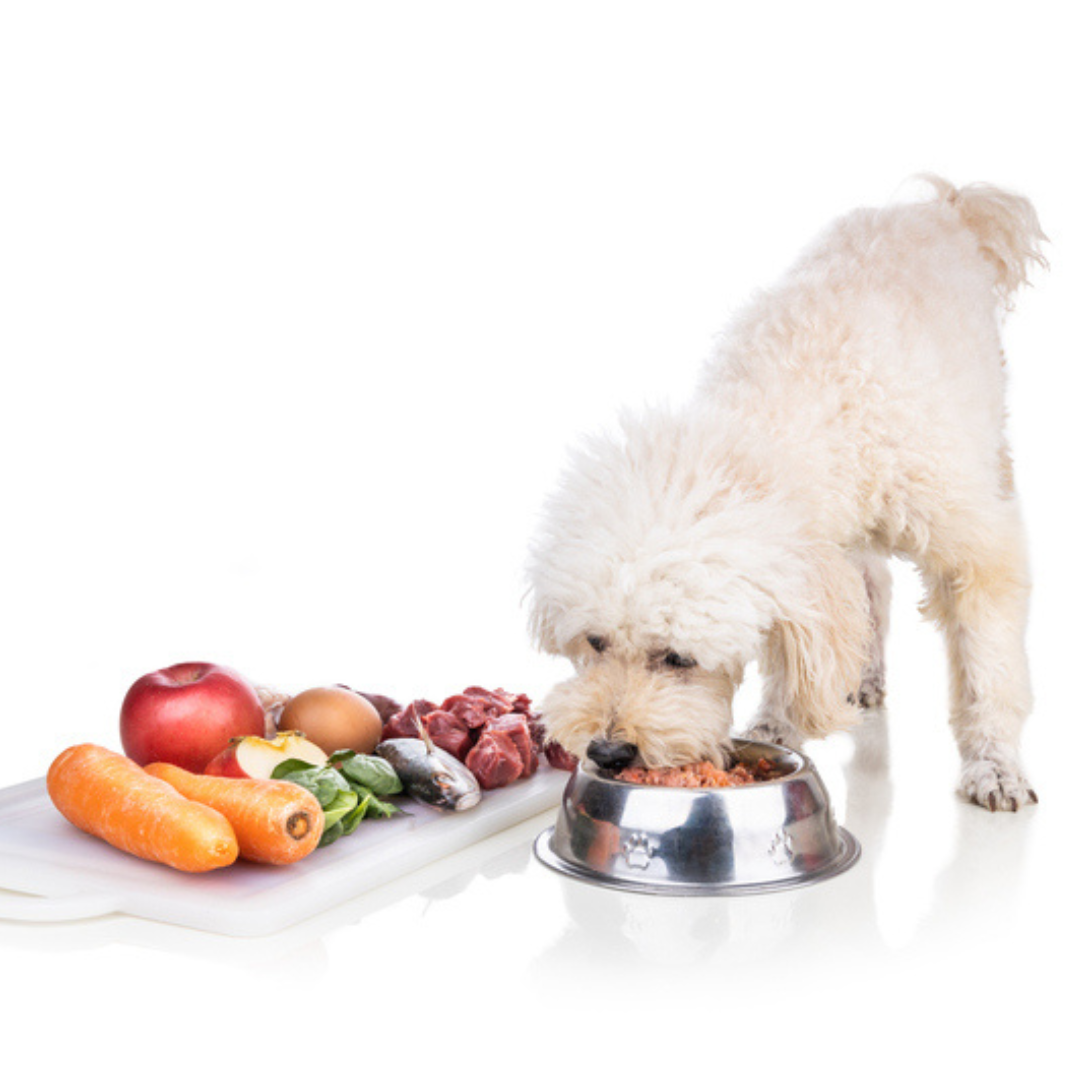Highlights of Asparagus Blog for Dogs
Understanding the nutritional value of asparagus for dogs
Guide on how to feed asparagus to your dog
Fun Treast recipes
Recommendations, tips, and alternatives
Quick and easy recipes
At Dog Child, we love showing you new and fresh foods you can incorporate into your dog’s diet. With spring here there are lots of fresh asparagus so it is only natural to wonder "Can dogs eat asparagus?" Let's dive into all things regarding dogs and asparagus, including whether it's safe for them to eat, the nutritional benefits it can provide, easy recipes with asparagus, potential risks to be aware of, and how to prepare this green veggie for your pup.
Is Asparagus Safe for Dogs to Eat? Is Asparagus Healthy for Dogs?
Absolutely! Asparagus is perfectly healthy for dogs to eat when consumed in moderation. This vegetable, known for its nutrition, is indeed a safe choice for your pup. However, as with introducing any new food item to your dog's diet, it's important to proceed with caution. The key is to ensure that the asparagus is properly prepared—cooked to avoid any potential choking hazards chopped into bite-sized pieces and served without any added seasonings or oils that could be harmful to your pup.
While the stalks of asparagus are nutritious, monitoring your dog's individual reaction to asparagus is also advisable, as each dog's digestive system is unique. Some may find asparagus to be a delicious addition to their diet, while others may experience mild gastrointestinal discomfort. Introducing asparagus gradually into your dog's diet allows you to gauge their tolerance.
The Nutritional Benefits of Asparagus for Dogs
The benefits of this green veggie are endless for your pup. This vibrant vegetable stands out as a nutritional powerhouse, rich in fiber, which is crucial for maintaining a healthy digestive system in dogs. Fiber aids in regular bowel movements and contributes to a feeling of fullness, potentially preventing overeating. Asparagus also shines brightly with its antioxidant properties, fighting against cellular damage and supporting a robust immune system.
Vitamins A, C, and K are present in asparagus, each playing a pivotal role in your dog's health. Vitamin A is essential for optimal eye health and maintaining healthy skin and coat, while Vitamin C is known for its immune-boosting properties. Vitamin K contributes to strong bones and proper blood clotting mechanisms. Together, these vitamins work synergistically to ensure your dog enjoys not only a delicious treat but also a boost to their overall well-being.
Asparagus can also help prevent UTIs by flushing extra liquid and salt for their bodies. A 2020 study showed that it is a natural diuretic. So if your pup suffers from urinary tract issues asparagus could help
3 Easy Treat Recipes for Dogs with Asparagus
Now that you know all the healthy benefits of asparagus let’s show you some fun ways to cook these up for your dog.
1. Asparagus and Chicken Bites
Ingredients:
1 cup cooked chicken breast, shredded
1/2 cup cooked asparagus, chopped
1/2 cup carrots, finely grated
1/2 cup rolled oats
1 egg
Instructions:
Preheat your oven to 350°F (175°C).
In a large bowl, mix the shredded chicken, chopped asparagus, grated carrots, and rolled oats.
Beat the egg and add it to the mixture, stirring until well combined.
Form the mixture into small, bite-sized balls and place them on a baking sheet lined with parchment paper.
Bake for 20-25 minutes, or until the bites are golden brown and firm to the touch.
Let them cool completely before serving to your dog.
2. Asparagus and Sweet Potato Mash
Ingredients:
1 medium sweet potato
1/2 cup asparagus, chopped
1 tablespoon olive oil
1/4 cup plain yogurt
Instructions:
Peel and dice the sweet potato into small chunks.
In a medium pot, bring water to a boil and add the sweet potato chunks. Cook until tender, about 10-15 minutes.
Steam the chopped asparagus for about 5 minutes, until tender.
Drain the sweet potatoes and place them in a large bowl. Mash them with a fork or potato masher.
Add the steamed asparagus, olive oil, and plain yogurt to the mashed sweet potatoes. Mix until well combined.
Let the mash cool to room temperature before serving it to your dog.
3. Asparagus and Salmon Treats
Ingredients:
1 can salmon in water, drained
1/2 cup cooked asparagus, finely chopped
1/4 cup whole wheat flour
1 egg
1/4 cup parsley, finely chopped (optional)
Instructions:
Preheat your oven to 350°F (175°C).
In a large bowl, mix the drained salmon, chopped asparagus, and whole wheat flour.
Beat the egg and add it to the mixture, stirring until well combined.
If using parsley, add it to the mixture and mix well.
Roll the mixture into small balls and place them on a baking sheet lined with parchment paper.
Flatten each ball slightly with the back of a spoon or your hand.
Bake for 20-25 minutes, or until the treats are firm and slightly browned.
Let them cool completely before serving to your dog.
These recipes are designed to be healthy and safe for dogs, but it's always a good idea to start slow when introducing new foods. Also remember that treats should only make up about 10% of your dog’s diet.
If you’d like to cook full meals for your pup check out our recipe community filled with meal ideas - all our recipes have been created by leading nutritionists.
Dog Child Mixed Veggie Meal Mix for Dogs
If you’re looking for a quick and nutritious way to add veggies then Dog Child’s Mixed Veggie Meal Mix is perfect. Filled with nutritious vegetables such as sweet potato, broccoli, pumpkin, kale, and parsley, you simply rehydrate with water and mix in with your dog’s ground protein of choice - voila you have a homemade meal for your dog.
Get your dog our Mixed Veggie Meal Mix today.
Things to Be Aware Of: Potential Risks and Considerations
One notable concern involves the dog's ability to digest asparagus properly. Due to its fibrous nature, asparagus may pose a challenge for some dogs, potentially leading to digestive discomfort such as gas or diarrhea. Additionally, the size and texture of asparagus stalks, if not properly prepared, could be difficult for dogs to chew and swallow, increasing the risk of choking. It's also crucial to recognize that the asparagus plant outside of its edible stalks - particularly the ferns and berries - carries toxins harmful to dogs. This underscores the importance of ensuring that your dog only consumes the safe parts of the vegetable. Being mindful of these potential issues allows dog parents to make informed decisions, ensuring the health and safety of their beloved pups as they explore the benefits of incorporating asparagus into their diet.
If you’re looking for more vegetables to feed your dog read Should Dogs Eat Vegetables?
Preparing Asparagus for Your Dog: Tips and Tricks
To ensure your dog reaps the benefits of asparagus without any downsides, preparation is key. Begin by selecting fresh, green asparagus stalks, as these are the most tender and nutrient-dense. Wash them thoroughly under running water to remove any dirt or pesticides. The next step is critical: cooking the asparagus. Raw asparagus is tough and can be difficult for dogs to digest, so it's best to cook it to a soft consistency. Steaming is the recommended method, as it preserves most of the nutrients while making the stalks easier for your dog to chew and digest. Simply chop the asparagus into bite-sized pieces, suitable for your dog's size, to prevent any choking hazard. Avoid the temptation to season or add oils, as these can upset your dog’s stomach or be harmful to their health.
How to Serve Asparagus to Your Dog: Creative Ideas
Introducing asparagus into your dog's diet opens up a world of culinary creativity, offering a variety of ways to incorporate this nutrient-dense vegetable into their meals. Lightly steamed asparagus can be finely chopped and sprinkled over their regular meals. If you're in the mood to bake homemade dog treats, check out the recipes above.
Why Asparagus Deserves a Spot in Your Dog's Diet
Introducing asparagus to your dog’s diet offers a unique blend of nutrition and taste that can contribute significantly to their health and vitality. This vegetable is more than just a treat; it’s a multi-faceted health booster, packed with essential vitamins and minerals. The presence of antioxidants in asparagus supports the fight against free radicals, promoting cellular health and reducing the risk of chronic diseases. As a fiber-rich food, it aids in digestion, ensuring your dog maintains a healthy gut. Additionally, the inclusion of asparagus can diversify your dog's diet, providing them with a broader spectrum of nutrients that might not be available in their regular meals.
FAQs
Many dog parents have questions about incorporating asparagus into their dogs' diets. Here are a few common questions answered for your peace of mind:
Can dogs eat raw asparagus? While not toxic, raw asparagus is tough and can be difficult for dogs to digest. It's recommended to cook it to make it easier for them to chew and absorb the nutrients.
How much asparagus can I feed my dog? Moderation is key. Start with small, bite-sized pieces to see how your dog reacts and to prevent any potential digestive upset.
Are there any health benefits to feeding my dog asparagus? Absolutely! Asparagus is rich in fiber, vitamins A, C, and K, and antioxidants, all of which contribute to a healthy diet.
Can asparagus help with my dog's digestion? Yes, the fiber content in asparagus can aid in digestion and help maintain a healthy gut. However, it's important to introduce it slowly to avoid any gastrointestinal discomfort.
Can Dogs Eat Asparagus Cooked? Absolutely just make sure it is bit size pieces and not full stalks to avoid choking.





